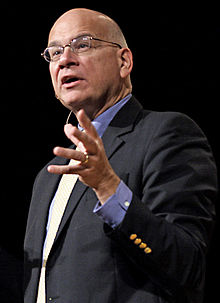
PRINCETON, N.J. (BP) — Princeton Theological Seminary’s reversal of its decision to give an award to New York pastor Tim Keller has drawn criticism as shameful and contrary to the seminary’s theological heritage.
 Princeton Seminary, the flagship institution of the Presbyterian Church (U.S.A.), had announced Keller as the recipient of its Abraham Kuyper Prize for Excellence in Reformed Theology and Public Witness, a $10,000 award. But in a March 22 letter to the seminary community, President Craig Barnes said the decision had been reversed in order to “not imply any endorsement” of Keller’s “belief that women and [lesbian, gay, bisexual, transgender] persons should not be ordained.”
Princeton Seminary, the flagship institution of the Presbyterian Church (U.S.A.), had announced Keller as the recipient of its Abraham Kuyper Prize for Excellence in Reformed Theology and Public Witness, a $10,000 award. But in a March 22 letter to the seminary community, President Craig Barnes said the decision had been reversed in order to “not imply any endorsement” of Keller’s “belief that women and [lesbian, gay, bisexual, transgender] persons should not be ordained.”
Houston Baptist University President Robert Sloan, a 1973 master of divinity graduate from Princeton Seminary, said the decision not to give Keller the Kuyper Prize is “a terrible shame.”
“It seems to be an indication of … pretty narrow and dogmatic thinking first to offer and then under pressure to retract the offer of an award to a theologian and pastor … as distinguished as Tim Keller,” Sloan told Baptist Press. “They knew Tim Keller’s views before they made the offer of the award.”
Keller, a bestselling author and pastor of New York’s Redeemer Presbyterian Church, will still lecture at Princeton Seminary April 6 as planned, Barnes said.
In a previous letter to the seminary community, Barnes noted protests of Keller’s scheduled visit and said Princeton Seminary “stand[s] in prophetic opposition” to Keller’s denomination, the Presbyterian Church in America (PCA), and to “many other Christian denominations that do not extend the full exercise of the Spirit filled gifts for women or those of various sexual orientations.”
While the PCA’s “Book of Church Order” — which all the denomination’s pastors must uphold — limits the office of pastor to men and defines marriage as “between one man and one woman,” Religion News Service noted Keller “is not known for pushing hot-button culture war issues.”
Southern Baptists who hold Princeton Seminary degrees expressed disappointment with the seminary’s action.
According to the seminary’s reasoning, Sloan said, Kuyper himself apparently would be ineligible for the prize bearing his name because he believed in male leadership within churches and homes.
Keller’s “views are not outrageous,” Sloan said. “His views represent very respectable, well thought out views on the nature of personhood, on the nature of marriage, on the nature of family. The attempt to suppress these kinds of views is not representative of clear thinking or argument. It’s just sheer political force and power.”
James Leo Garrett, a former theology professor at both Southwestern Baptist Theological Seminary and Southern Baptist Theological Seminary, told BP, “As a graduate of Princeton Seminary … I would register my regret that the seminary would have declined the honor to be accorded to Pastor Tim Keller.”
Garrett, who earned a master of theology degree from Princeton Seminary in 1949, said the institution has changed since the 19th and 20th centuries, when “a stream” of Southern Baptists studied there, including Southern Seminary founders James P. Boyce and Basil Manly Jr. in the 19th century. In the 20th century, Princeton Seminary graduates included Cecil Sherman, who pastored in Texas and North Carolina, and James Langley, who served as executive director of the District of Columbia Baptist Convention.
“We have a different situation today,” Garrett said. “The Presbyterian Church (U.S.A.) has made its stand on a number of issues such that [Princeton Seminary] is no longer under evangelical leadership.”
Southern Seminary President R. Albert Mohler Jr. said Princeton Seminary began to shift in 1929, when it reorganized to reflect the so-called “modernist” perspective in the modernist-fundamentalist controversy of the early 20th century.
The “theological diversity that is championed at Princeton” today “does not include the very theology that Princeton was established to contend for,” Mohler said March 23 on his podcast The Briefing.
Noting “it’s hard to imagine any evangelical minister nicer than Tim Keller,” Mohler said “Keller’s demeanor and character were not why he was rejected…. What was rejected is the theology represented by Tim Keller and the denomination of which he is a part. So even in the supposedly post-theological age, here you have the left making very clear what we’ve been saying all along. Theology matters. It always matters.”
Denny Burk, president of the Council on Biblical Manhood and Womanhood, wrote in a March 22 blog post that by Princeton Seminary’s logic, theological “giants” from the seminary’s history like Charles Hodge and B.B. Warfield “would not be qualified” to receive the Kuyper Prize.
Burk added that if the seminary’s reasoning were followed consistently, “no faithful Christian would ever be qualified to win this award. Why? Because it is impossible to be a faithful follower of Christ while rejecting what Christ teaches about sexual immorality. And rejecting Christ’s teaching on this point is apparently a prerequisite of the award.”
Others to oppose Princeton Seminary’s decision not to give Keller the Kuyper Prize included Midwestern Baptist Theological Seminary professor Owen Strachan and Mark Tooley, president of the Institute on Religion and Democracy, a group that seeks renewal in mainline Protestant denominations.















